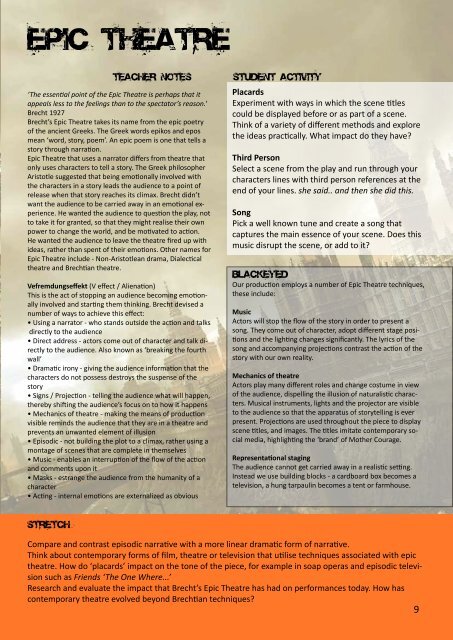Mother Courage Education Pack - Theatre Severn
Mother Courage Education Pack - Theatre Severn
Mother Courage Education Pack - Theatre Severn
Create successful ePaper yourself
Turn your PDF publications into a flip-book with our unique Google optimized e-Paper software.
‘The essential point of the Epic <strong>Theatre</strong> is perhaps that it<br />
appeals less to the feelings than to the spectator’s reason.’<br />
Brecht 1927<br />
Brecht’s Epic <strong>Theatre</strong> takes its name from the epic poetry<br />
of the ancient Greeks. The Greek words epikos and epos<br />
mean ‘word, story, poem’. An epic poem is one that tells a<br />
story through narration.<br />
Epic <strong>Theatre</strong> that uses a narrator differs from theatre that<br />
only uses characters to tell a story. The Greek philosopher<br />
Aristotle suggested that being emotionally involved with<br />
the characters in a story leads the audience to a point of<br />
release when that story reaches its climax. Brecht didn’t<br />
want the audience to be carried away in an emotional experience.<br />
He wanted the audience to question the play, not<br />
to take it for granted, so that they might realise their own<br />
power to change the world, and be motivated to action.<br />
He wanted the audience to leave the theatre fired up with<br />
ideas, rather than spent of their emotions. Other names for<br />
Epic <strong>Theatre</strong> include - Non-Aristotlean drama, Dialectical<br />
theatre and Brechtian theatre.<br />
Vefremdungseffekt (V effect / Alienation)<br />
This is the act of stopping an audience becoming emotionally<br />
involved and starting them thinking. Brecht devised a<br />
number of ways to achieve this effect:<br />
• Using a narrator - who stands outside the action and talks<br />
directly to the audience<br />
• Direct address - actors come out of character and talk directly<br />
to the audience. Also known as ‘breaking the fourth<br />
wall’<br />
• Dramatic irony - giving the audience information that the<br />
characters do not possess destroys the suspense of the<br />
story<br />
• Signs / Projection - telling the audience what will happen,<br />
thereby shifting the audience’s focus on to how it happens<br />
• Mechanics of theatre - making the means of production<br />
visible reminds the audience that they are in a theatre and<br />
prevents an unwanted element of illusion<br />
• Episodic - not building the plot to a climax, rather using a<br />
montage of scenes that are complete in themselves<br />
• Music - enables an interruption of the flow of the action<br />
and comments upon it<br />
• Masks - estrange the audience from the humanity of a<br />
character<br />
• Acting - internal emotions are externalized as obvious<br />
Placards<br />
Experiment with ways in which the scene titles<br />
could be displayed before or as part of a scene.<br />
Think of a variety of different methods and explore<br />
the ideas practically. What impact do they have?<br />
Third Person<br />
Select a scene from the play and run through your<br />
characters lines with third person references at the<br />
end of your lines. she said.. and then she did this.<br />
Song<br />
Pick a well known tune and create a song that<br />
captures the main essence of your scene. Does this<br />
music disrupt the scene, or add to it?<br />
Our production employs a number of Epic <strong>Theatre</strong> techniques,<br />
these include:<br />
Music<br />
Actors will stop the flow of the story in order to present a<br />
song. They come out of character, adopt different stage positions<br />
and the lighting changes significantly. The lyrics of the<br />
song and accompanying projections contrast the action of the<br />
story with our own reality.<br />
Mechanics of theatre<br />
Actors play many different roles and change costume in view<br />
of the audience, dispelling the illusion of naturalistic characters.<br />
Musical instruments, lights and the projector are visible<br />
to the audience so that the apparatus of storytelling is ever<br />
present. Projections are used throughout the piece to display<br />
scene titles, and images. The titles imitate contemporary social<br />
media, highlighting the ‘brand’ of <strong>Mother</strong> <strong>Courage</strong>.<br />
Representational staging<br />
The audience cannot get carried away in a realistic setting.<br />
Instead we use building blocks - a cardboard box becomes a<br />
television, a hung tarpaulin becomes a tent or farmhouse.<br />
Compare and contrast episodic narrative with a more linear dramatic form of narrative.<br />
Think about contemporary forms of film, theatre or television that utilise techniques associated with epic<br />
theatre. How do ‘placards’ impact on the tone of the piece, for example in soap operas and episodic television<br />
such as Friends ‘The One Where...’<br />
Research and evaluate the impact that Brecht’s Epic <strong>Theatre</strong> has had on performances today. How has<br />
contemporary theatre evolved beyond Brechtian techniques?<br />
9


